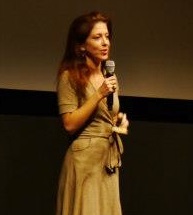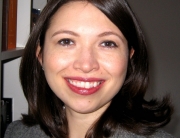 Dana Weissman loves her job as Director of Programs at the Writers Guild of America, East. She has worked in the nonprofit/arts world—specializing in cultural communications, audience development, and business development—for 12 years. Dana directs all member events and programs for WGAE including elections, seminars, workshops, panel discussions, social events, screenings, film festival outreach, and the annual WGA Awards competition and celebration. She’s also worked at the 92nd Street Y, The Educational Alliance, and Care2.com. A graduate of Arts & Business Council of New York City’s Arts Leadership Institute, she is a founding member of Emerging Leaders in New York Arts and the co-founder of the Tufts Alumni Nonprofit Roundtable. Dana recently joined WFUV Radio’s Community Advisory Board. Here’s her career advice and what she has to say on loving her job.
Dana Weissman loves her job as Director of Programs at the Writers Guild of America, East. She has worked in the nonprofit/arts world—specializing in cultural communications, audience development, and business development—for 12 years. Dana directs all member events and programs for WGAE including elections, seminars, workshops, panel discussions, social events, screenings, film festival outreach, and the annual WGA Awards competition and celebration. She’s also worked at the 92nd Street Y, The Educational Alliance, and Care2.com. A graduate of Arts & Business Council of New York City’s Arts Leadership Institute, she is a founding member of Emerging Leaders in New York Arts and the co-founder of the Tufts Alumni Nonprofit Roundtable. Dana recently joined WFUV Radio’s Community Advisory Board. Here’s her career advice and what she has to say on loving her job.
1. What do you love about your job?
My favorite part of my job is getting to interact with writers all of the time, having writers as “clients.” They are, by and large and by definition, witty, talkative, interesting, industrious, funny, wacky and intelligent. I get to help them fill in the holes in their lives or, at least, their careers. And that makes us all happy.
I’m also extremely fortunate to have interesting and cool colleagues, especially my supervisor, whom I adore. She complements my style perfectly while making me better where I need to be better. We’re a great team.
2. Did you always know this was the job or career path for you?
Actually, I quite fell into my current role; but as we Jews say, it was bashert, meant to be. I have a background in publishing books, magazines and websites, on the writing/editorial side as well as in publicity. I’ve made a living as a writer, just like our members, although I wrote for publications and guidebooks, rather than scripts. But I think that helps me get them and what they want or need. The bulk of my experience has been in audience development for artistic organizations, community outreach, and programming. Plus, I’ve been a TV/movie geek forever. Now I get to geek out for a living.
3. What are the most important lessons you have you learned along the way?
Trust your gut. Be yourself. Don’t burn your bridges. Dress for the job you want, even if it isn’t the one you’ve got. You are more important than your job. Those are some good ones.
The toughest bosses are the ones that, in the end, will have been the most responsible for your career success. So the tears suck, but if you’re lucky, they’re worth it. This is also something I try to remember in managing others, which is hard, because we all want to be liked. That said, I’m pretty sure I’m not about to make anyone cry.
It’s better to have a mindset geared toward diversity in everything you do, than a diversity component. For example, include women and people of color wherever possible on every panel or article. Don’t have a panel for black filmmakers, or women in comedy. Don’t ghetto-ize those who are already disenfranchised.
4. Tell us about a defining moment for you related to your work.
I hit a rough spot during the recent recession, along with most people out there. Since times were tough, I decided to accept an opportunity that was a bit of a stretch – a tech sales position, but one in the social service sector. The money promised to be great and I thought, I can do this for a few years, until the economy turns around.
Right before I was set to begin work, I started having some serious anxiety about the decision. I couldn’t sleep. I had a gut feeling that everything I’d worked for thus far was about to be chucked out the window. What I learned is that, at least for me, the “short term” decision can mean short-changing myself, in a lasting way. As I said before, trust your gut. That job was the worst, and I cut my losses (i.e. quit) almost immediately, because I didn’t want to waste the company’s time and money. I don’t think the CEO appreciated it, but it would have been much worse if I’d stayed in a place I didn’t belong. Everyone would have lost. That said, everyone has to pay their dues. You need to start somewhere. I’m not trying to dissuade anyone of that. I think younger folks are starting to realize that, unless you’re at a small mom-and-pop, you’re not going to run a department right out of school. It’s a tough lesson to learn, but it’s a crucial one.
5. What advice do you have for people looking to find work they love, in your field, or any field?
Finding your dream gig is like dating. It is preferable to have many jobs before you settle on “The One.” So, despite what my answer to the last question might have suggested, I do believe that there’s value in playing the field. Set out with the following formula:
A. What effect do I want my work to have on the world?
B. What are my skills?
C. What do I enjoy doing?
Find an opportunity that combines your answers to these questions, and try it! The worst you can do is learn something.










Get Social